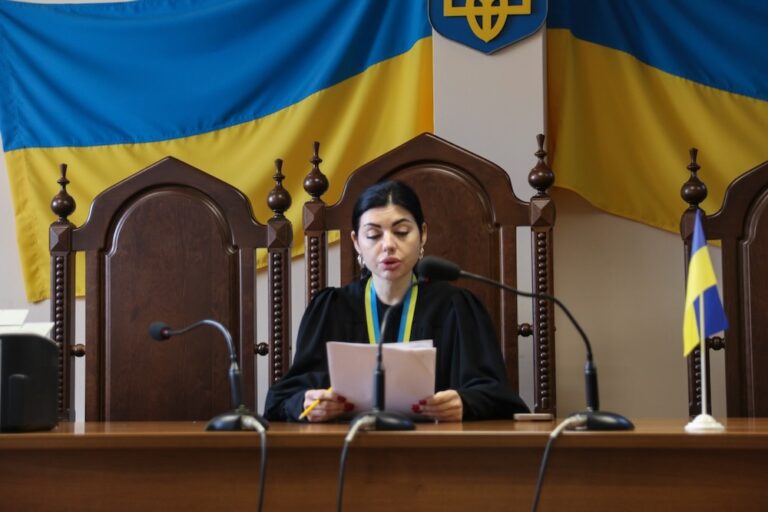Privately-run TV stations TVi and 5 Kanal were the only two independent and unbiased channels left in the country, according to the Ukrainian media watchdog Telekritika.
(IPI/IFEX) – Vienna, 30 August 2010 – The International Press Institute (IPI) today expressed grave concern for the state of media freedom in Ukraine after a court ruling forced one TV station off the air and limited the licences of another.
At a hearing in Kiev on Monday, 30 August, the two privately-run TV channels, TVi and 5 Kanal, were told their broadcast frequencies would be cancelled after the court found in favour of allegations of irregularities in the manner in which the stations were awarded their licences. As TVi had renewed all its licences in the contested application, the channel lost all its licences; 5 Kanal only lost the new licences it had been awarded, limiting its broadcast reach across the vast country.
Senior executives from the stations, as well as members of the National Board of Ukraine for Television and Radio, who awarded the licences, could all face criminal proceedings and ultimately prison sentences. The case now lies in the hands of the prosecutor general.
According to Ukrainian media experts, 5 Kanal and TVi are among the few Ukrainian TV channels that provide independent news coverage. In May, Natalia Ligacheva, chief editor of Kyiv-based Telekritika media watchdog, stated that the stations were the only remaining channels that Telekritika considered as unbiased.
Speaking to IPI by telephone shortly after the verdict, TVi Chief Executive Mykola Kniazhytskyi said: “As much as I expected it [the verdict], I am in shock.
“We are forbidden to broadcast as of today. We consider this unlawful, but there is little we can do. We can still petition a higher court. It’s a futile gesture but we will still make it,” said Kniazhytskyi.
Owner of rival media holding Inter Media Group and head of Ukrainian Security Service, Valeriy Khoroshkovsky, has been accused by 5 Kanal of influencing the decision to remove licences, allegations Khoroshkovsky has strongly refuted. Khoroshkovsky had recently asked for a new tender for frequencies. According to the Kyiv Post, Inter Media Group currently indirectly owns 61 per cent of the shares of the Ukrainian Independent TV Corporation (Inter TV channel), 100 per cent of the TV Studio Information Service (NTN TV channel), 90 per cent of Music-TV (Enter Music TV Channel), as well as television channels K1, K2, Megasport and various other media assets.
In an earlier interview, Kniazhytskyi had said that since President Viktor Yanukovych was elected at the beginning of the year “a number of topics became off-limits.”
“It is clear the judge was prejudiced,” Kniazhytskyi said today. “This is a turning point [for press freedom]. They are not going to stop at this.”
TVi can still operate its website and is still able to broadcast via cable.
“Our viewership is severely limited. This is not economically viable; we cannot make a living like this. It is crippling,” said Kniazhytskyi.
Concern over the deterioration of press freedom in Ukraine has been growing in recent months. In an open letter to President Yanukovych earlier this month, IPI called attention to a rise in attacks on journalists along with a growing climate of impunity, as well as the TVi/5 Kanal court case. Although President Yanukovych commented on the letter indirectly to the Ukrainian media, IPI has yet to receive a direct response.
During his current visit to Germany, German Chancellor Angela Merkel today called on President Yanukovych to address unanswered questions regarding some democratic processes in his country, “in particular in the area of press freedom and the freedom of expression.” According to the Associated Press, Merkel said both sides had agreed to openly and frankly discuss these issues in the future, if critical questions arise. Yanukovych offered no reply.
“This is a damaging blow to media freedom and the independent media in Ukraine,” said IPI Interim Director Alison Bethel McKenzie. “A diverse and critical media is the cornerstone of democracy and we are deeply concerned by the deterioration of media freedom in Ukraine.
“I welcome Chancellor Merkel’s comments to President Yanukovych during his visit to Germany. Ukraine cannot be allowed to slide back into a climate of fear and repression that it has previously suffered.”
Bethel McKenzie also expressed concern for the well being of missing journalist Vasyl Klymentyev. According to the Kyiv Post, Interior Minister Anatoly Mogylyov told reporters on 27 August that investigators have reason to believe the editor-in-chief of the Noviy Stil newspaper, who has been missing since Wednesday, 11 August, is dead and could have been killed by police in the eastern region of Kharkiv, where Klymentyev was based. His case is being treated by the authorities as a “premeditated murder,” although Klymentyev has yet to be found.
Although a number of concerns remained, there had been a marked improvement in press freedom since the Orange Revolution of 2004, which saw protests and following elections marred by corruption. Since the election of President Yanukovych in February 2010, the press freedom climate has again deteriorated.


